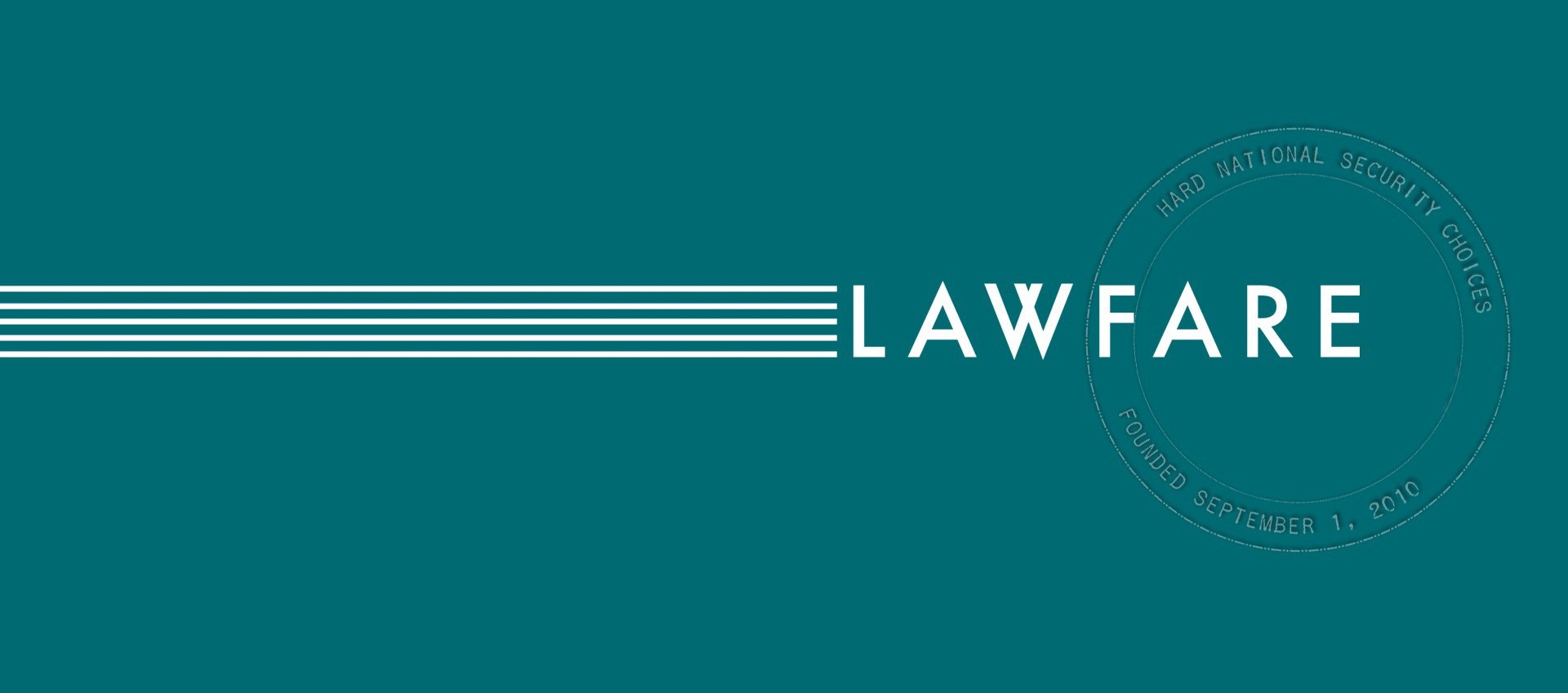The Week That Was: All of Lawfare in One Post
Your weekly summary of everything on the site.

Published by The Lawfare Institute
in Cooperation With

Benjamin Wittes reflected on former President Donald Trump’s guilty verdict in People v. Trump. He examined what Trump’s felony conviction may mean for the upcoming presidential election and the future of U.S. democracy.
On Trump Trials and Tribulations, Wittes sat down with Tyler McBrien, Anna Bower, Roger Parloff, and Quinta Jurecic to discuss the verdict delivered in the NYC Trump trial: guilty on 34 felony counts for falsification of business records in the first degree. They talked about the guilty verdict, what this may mean going forward, and more:
On May 30, Maya Nicholson shared a livestream of Manhattan District Attorney Alvin Bragg’s press conference, where he discussed Trump’s guilty verdict in the New York criminal trial.
Bower, McBrien, Katherine Pompilio, and Wittes reported on the final week of Trump’s New York criminal trial, including the closing arguments from defense attorney Todd Blanche and prosecutor Joshua Steinglass, and jury instructions and charges.
Parloff analyzed Bragg’s decision to prosecute Trump in the New York hush money trial, through the lens of a personal account from former special assistant district attorney Mark Pomerantz regarding his experience investigating Trump in his book, People v. Trump: An Inside Account.
On May 28, Parloff spoke to Bower, McBrien, Pompilio, and Wittes for Lawfare’s post-court dispatch. If you couldn't attend the live event, the recording is available on Lawfare’s YouTube channel or later on the Lawfare Podcast feed. You can also watch all other post-court dispatches here:
On Lawfare Daily, Wittes talked to Jurecic and Parloff about the timing of Trump’s D.C. case, Judge Aileen Cannon's denial of Special Counsel Jack Smith's gag order request in Florida, updates in the Fulton County case, the performance of Trump's attorneys and jury deliberations in the New York case, and more:
On May 31, Nicholson shared a livestream of President Joe Biden speaking about the Middle East.
Chimène Keitner examined the International Court of Justice’s modified provisional measures against Israel in South Africa v. Israel, regarding its military operations in Rafah.
On Lawfare Daily, Molly Reynolds sat down with Tara Varma and Sophie Roehse to discuss the upcoming European Parliament elections. They talked about what the elections mean for European politics, how they might affect key issues facing the United States, including the war in Ukraine and relations with China, and more:
On Lawfare Daily, Anna Hickey sat down with Thomas de Waal to discuss a controversial foreign agent bill titled “Transparency of Foreign Influence” passed by the Georgian parliament, which has led to mass protests across the country. They talked about what exactly was in the bill, why it was so controversial, how the United States and European Union have reacted, and more:
On Rational Security, Scott Anderson and Alan Z. Rozenshtein sat down with Natalie Orpett, Eugenia Lostri, and Kevin Frazier to talk about the week’s big national security news stories. They discussed the developments in the resettlement of detainees from Guantanamo Bay to Oman, the dissolution of OpenAI’s “superalignment” team, the increasing concern from U.S. officials regarding China and Russia’s attempts to access or disrupt undersea cables that power much of the global telecommunications system, and more:
Moshe Klein explained how terrorist organizations have leveraged the virtual currency and digital assets in video games to conduct illicit financial activity. He described how implementing recommendations from the Financial Action Task Force could help to detect and deter terrorist financing through video games.
Alexander Macgillivary identified two uncertainties regarding artificial intelligence (AI)—the cost and distribution of future AI systems and its developmental trajectory—and why policymakers should continue to craft flexible regulation despite unknowns about AI’s future.
In the latest installment of Lawfare’s Foreign Policy Essay series, Sarah Kreps challenged the assumption that the regulation of artificial intelligence should be left to Congress, suggesting that non-traditional “regulators”—such as developers of the technology and the public—may play useful roles in mapping a regulatory landscape.
On Lawfare Daily, Frazier and Rozenshtein sat down with Tom Wheeler to discuss the latest development in AI governance, including Wheeler’s book, “Techlash: Who Makes the Rules in the Digital Gilded Age?” They talked about Wheeler’s case for a more agile approach to regulating AI and other emerging technologies, how the current agencies lack the culture, structure, and personnel required to move at the speed of new technologies, and more:
In this week’s installment of the Seriously Risky Business cybersecurity newsletter, Tom Uren discussed a report released by TikTok describing the influence campaigns it disrupted earlier this year, the need for a U.S. Cyber Force, the cybercriminal “group” Scattered Spider that is responsible for cyber attacks against casinos in Las Vegas, and more.
Maia Hamin, Trey Herr, and Marc Rogers discussed a recently released report from the Cyber Safety Review Board on an intrusion into Microsoft’s cloud infrastructure, what it reveals about the status of cloud security, and policy reforms that could address extant vulnerabilities.
In the latest installment of Lawfare’s Security by Design project, Derek E. Bambauer and Melanie J. Teplinsky explained what a “standard of care” and a “safe harbor” against liability mean in the Biden administration’s proposals for governing software liability.
On Chatter, David Priess sat down with Anaïs Maurer, professor of literature at Rutgers University and author of “The Ocean on Fire,” which explores the intersection of the legacy of colonial powers' massive nuclear detonations in Oceania, critical threats from climate change, and stories the people in Oceania tell about it all. They discussed her experience growing up in Oceania, how the people of Oceania have addressed radiation effects through stories, how these narratives inform the current era of climate change, and more:
And on April 3, Lawfare announced an auction item on the Givebutter campaign—the “Black Hole of Awful” Post-It by Jurecic, one-of-a-kind Lawfare sketch born from a conversation with Wittes that illustrates the extent to which trial delay is advantageous to Trump. Place your bids to support Lawfare’s Trump Trials coverage. You can also support Lawfare’s Trump Trials coverage by making a contribution here.
And that was the week that was.



